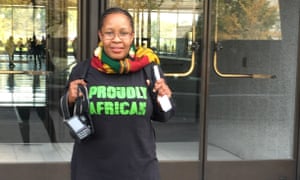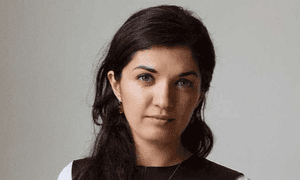Koketso Moeti, a civic activist in South Africa, had kept on putting off her bid for a fellowship at Barack Obama’s foundation. On the last day before the applications deadline, she decided to go for it. “That’s when I got the courage,” she recalled. “I decided I’m going to be brave and bite this bullet. But I didn’t have an internet connection.”
Fortunately a friend at a university in Johannesburg stepped in and she hit the button with just minutes to spare. “It was, ‘I hope nothing goes wrong when I click submit.’ There was this mini-celebration when I got the confirmation.” Now the last-gasp effort has paid off: out of more than 20,000 applicants from 191 countries, Moeti is one of 20 inaugural Obama Foundation fellows.
The announcement, made via the Guardian on Monday, is the latest step in Obama’s political afterlife. The former president has spoken out against Donald Trump’s policies on only a handful of occasions, keen to avoid the criticism that he is leading the “resistance” or crowding out other Democrats. He is often at work at his Washington office writing a presidential memoir.
But he has long taken a particular interest in the next generation of leaders in America and around the world. Speaking at a conference in Japan last month, Obama said he aspired to create “a million young Barack Obamas or Michelle Obamas” who would pick up the baton in what he described as the “relay race that is human progress”.
The Obama Foundation describes the fellowship as a two-year non-residential programme that will bring together leaders who are “creating transformational change on many of the world’s most pressing problems”.
The fellows are engaged in areas including healthcare, community organising, technology and the arts. Their work includes empowering parents and teachers to improve schools, ensuring deaf children have equal access to literacy tools and engaging with the healthcare system to treat addiction.
Obama writes in an accompanying email: “These 20 leaders, representing 11 countries, are tackling some of the toughest challenges in their communities. They are doing the hard work – not for recognition, often without enough resources – because they have a vision of the world as it should be: a little more just, less isolated, more connected.”
He adds: “I couldn’t be prouder of this group, and I can’t wait to learn from them and watch them grow over the next two years. The Foundation will facilitate hands-on trainings, leadership development, coaching, and personalized plans and strategies to help these leaders scale the work they’ve already started.”

Moeti, 31, describes herself in her Twitter profile as: “Mother. Campaigner. Political orphan. Blogger. Part Time Professional Black. Liker of Things. Lover of People. No Sense of Humour.”
For nearly four years she has run amandla.mobi, a digital platform that has mobilised more than 200,000 people around various issues including police brutality and housing, and has a particular focus on black women in poverty.
Moeti welcomed the fellowship’s aim to break down cultural barriers between activists.
“It’s quite meaningful in this moment, when the right is rising, that the first US black president is doing something like this. I’m really looking forward to meeting the other fellows and finding out what they are working on.”
Another 2018 fellow is Zarlasht Halaimzai, who came to Britain as a refugee from Afghanistan when she was 11. After training in psychotherapy and counselling, she visited the Calais “Jungle” camp in France and was struck by the lack of volunteers who could speak the refugees’ languages. She is the co-founder of the Refugee Trauma Initiative (RTI), which gives psychological help to thousands of refugees traumatised by war, torture and displacement.

Halaimzai, 36, also applied for the fellowship on the last day before applications closed after being tipped off by a friend. “I’m thrilled to be part of it,” she said from northern Greece, where the RTI does much of its work. “It feels exactly the right thing for me.”
The Obamas had been a personal inspiration, she recalled. “When he was elected it was the first time I felt, as a minority in the UK, that I could shoot for the stars because the precedent had been set. Their commitment to empowering people and changing things in a creative way is great.”
The foundation said its selection of the 20 fellows weighed various factors including “geographic diversity, commitment to the Obama Foundation’s values, and existing work”.
They also include Sandor Lederer, building digital tools to help citizens push for transparency and good governance in Hungary, Keith Wattley, of Oakland, California, rehabilitating young people convicted of serious crimes, and Alex Smith, based in London and Manchester, fighting loneliness and polarisation in the UK by connecting the elderly and young professionals.
The first gathering will be in Chicago next month. There will be three more during the two-year programme, and fellows also get institutional support and are likely to meet Obama. Applications for its 2019 fellows class will open in the summer.